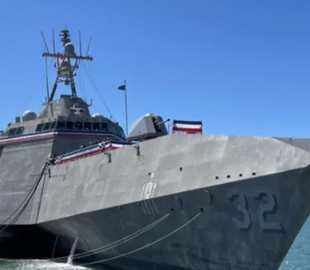
The situation in the area of Saudi Arabia continues to get complicated. The US Navy is rolling over four literal ships to increase the security of its forces in the region.
While numerous naval experts year after year try to retire this warship, the Navy has decided to deploy four Independence-class littoral combat ships to Bahrain starting next year to strengthen mine defense in the Middle East.
Focus translated Harrison Kass 's article on: Is There Hope for US Navy Littoral Combat Ships in the Middle East.
- The first three confirmed ships are USS Canberra, USS Tulsa, and USS Santa Barbara. This step will accelerate the retirement of old Avenger class ships.
- The Independence-class ships will be equipped with a modernized mine countermeasures complex, including modern sensors, software and unmanned aerial vehicles.
These ships are designed for near-shore operations and will significantly improve the Navy's mine-hunting capabilities in the region .
US Navy sends Independence-class littoral combat ships to Bahrain
Starting next year, the US Navy plans to deploy four littoral combat ships to Bahrain to improve mine countermeasures in the Middle East. The first three ships – USS Canberra, USS Tulsa and USS Santa Barbara – will belong to the Independence class. A fourth ship has not yet been selected.
Deploying the Independence ships in Bahrain will help the Navy decommission the Avenger-class ships that have been used for mine countermeasures since the 1980s. Decommissioning of the “Avengers” was delayed due to the fact that the littoral combat ships of the Navy were not equipped with a mine-seeking module. But now Independence finally got anti-mine modules.
The modernized package of mine countermeasures includes “the integration of sensors, software and unmanned aerial vehicles,” reports Stars and Stripes. According to U.S. Navy Rear Admiral Fred Pyle, “The Navy plans to have 15 Independence-class ships in the global fleet performing mine defense missions.”
The Navy is set to begin construction of an Independence-class pier in Bahrain, equipped “power supply, water supply, sewerage and Internet”.
“We have taken into account the lessons learned from the ships' deployment in Singapore… to best equip our waterfront to support [a littoral combat ship],” – said Captain Nathan Vemmett.
Littoral combat ships were always intended to have the ability to search for mines, but the remote mine search system, originally designed to be mounted on a ship, did not pass the reliability test. The Navy started from scratch developing the mine defense module that is now being integrated into the Independence-class ships.
What is a Littoral Combat Ship?
Littoral Combat Ships – they are fairly miniature vessels built for nearshore operations (the part of the ocean known as the littoral). The closest analogue of a littoral combat ship in foreign navies is a corvette. Designed with a futuristic bent, the littoral combat ship must be maneuverable and stealthy. To date, the US Navy has developed two different classes of littoral combat ships: Freedom and Independence.
Littoral combat ships are not designed to engage in combat with other surface ships in the open ocean. Accordingly, they have fewer means of protection. Instead, the littoral combat ship was designed with speed as a priority and a wide range of missions, including surface warfare, anti-submarine warfare, mine defense, irregular/amphibious operations.
The anti-mine defense module, which will be installed on ships in the port of Bahrain, is designed for remote detection and avoidance of mines, as well as for targeting and destroying mines. The system uses acoustic and magnetic signals to detect mines. Littoral combat ships can deploy Knifefish – an underwater drone used for mine countermeasures, as well as deploying helicopters to assist in mine detection.
In general, a littoral combat ship – it's a flexible vessel that should help the United States feel more comfortable in the increasingly turbulent waters around Saudi Arabia.
About the author
Harrison Cass – a journalist who writes about defense and national security. He has more than 1,000 articles on topics related to international problems. A lawyer, pilot, guitarist and professional hockey player, Harrison served as a trainee pilot in the US Air Force but was demobilized due to ill health. He received his BA from Lake Forest College, his J.D. from the University of Oregon, and his M.B.A. from New York University. Harrison is listening to the band Dokken.

